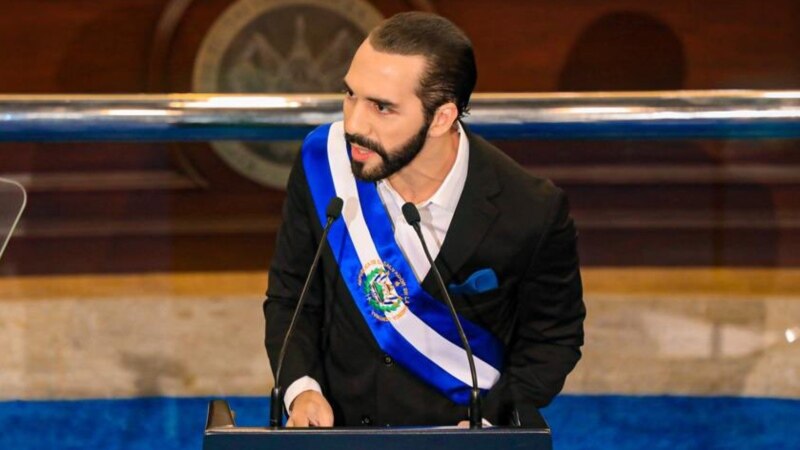
El Salvador’s time is running out to prepare its presidential and legislative election process in February 2024, but eight months after that event, the Executive, headed by Nayib Bukele, and Congress, with a majority in line with the president’s party, changed the electoral rules reducing from 84 to 60 the number of legislators for the following elections.
In addition, Congress already has in its hands the proposal to reduce the current 262 municipalities to 44, a change that according to the government has an economic background, but that according to the criteria of experts consulted by the voice of america It has been rushed, since it has disrupted a tight electoral calendar.
“There are various complications both for the electoral referee, in this case the Supreme Electoral Tribunal (TSE), and for the parties. The former has to assess whether to continue with the deadlines or extend deadlines to parties. Also assess whether it leaves on time with all the already planned activities of the electoral calendar that are with times that have been concatenated, times of law that are not administrative”, he explained to the VOAthe expert on electoral issues, Malcolm Cartagena.
As for the political parties, the expert points out that some already had the forms defined for the 262 municipal councils and not for 44. “What will happen to these forms, will they be dismantled? What will happen to the party agreements politicians to build coalitions?” he adds.
These changes would not have been possible if, in March of this year, the Salvadoran Congress had not repealed an article of the Electoral Code that prohibited reforming electoral processes one year before the elections.
Under this change in Congress, the position of the Supreme Electoral Tribunal, regarding the reform to reduce the number of legislators a few months before the elections, has been welcomed. The institution’s president magistrate, Dora Esmeralda Martínez, has already given the endorsement to adjust the General Election Plan 2024. Regarding the reduction of municipalities, it is still under discussion in Congress.
The president of the Nuestro Tiempo political party, Andy Failer, has asked the Court to rule on the possibility of reducing the number of municipalities, which is currently under study by a congressional commission. However, the institution has been concise in his position.
“Presiding Magistrate, four days ago President Nayib Bukele announced that the rules of the game will change radically. The parties have received registration applications for 262 municipalities, not 44. What is the position of the TSE in this scenario? said.
The reform to the Electoral Code, to reduce the number of legislators, was approved on June 7 “with a waiver of processing”, that is, immediately and without discussion in a congressional commission. The controversial reform included eliminating the “residue system” with which legislators from minority parties managed to enter Congress in the 2021 elections.
Today, with the reduction in the number of municipalities, the parties are expected to reject the 262 municipal government proposals that some have already received and only accept 44, which will be the official municipalities, if the proposal is approved.
Why have the changes occurred?
Both the Salvadoran government and electoral experts acknowledge that the reforms will impact the next elections.
But the Executive is of the idea that the changes are necessary for the economy of the Central American country. Also because it is a “popular outcry, manifested by different means…”, explains the initiative to reform the Electoral Code presented to Congress.
“These initiatives are intended to reduce public spending, improve the administration of the municipalities and that all the votes are truly representative of the will of the Salvadoran population,” said the Minister of the Interior, Juan Carlos Bidegain, on June 6, when handed over the initiative to the president of Congress.
Lawyer Ruth López, with a master’s degree in electoral law, believes that the reduction in the number of legislators and municipalities “does not have an economic background in any way.”
“What the reforms seek is to consolidate the power of the government party and modify the electoral system to bring it to the format of the dominant party. (…) Both co-optation and centralization inevitably lead to a totalitarian system,” said López to the VOA.
Malcolm Cartagena added that Latin America has a tendency to decentralize the role of central government from municipal government. But in El Salvador it is the opposite.
“I see a setback in something that had already advanced a lot, such as decentralization through mechanisms such as FODES, which were funds that were sent to the municipalities. Anyone would say that now it will be more efficient, but by reducing the municipalities, if one looks at the groups, the changes seem more electoral than economic, ”he added.
Before Bukele, municipalities in El Salvador received state funds for municipal works. This was a relief for small municipalities that could not carry out works because the taxes collected were not enough. However, since 2020 this changed and the Salvadoran government created the Municipal Works Directorate (DOM) to carry out these works, thus avoiding giving money to the municipalities.
With the changes now proposed, the government ensures that municipalities with robust economies will be the ones that will manage the funds of smaller municipalities, which will become districts.
Connect with the Voice of America! Subscribe to our channel Youtubeand activate notifications, or follow us on social networks: Facebook, Twitter and Instagram.












